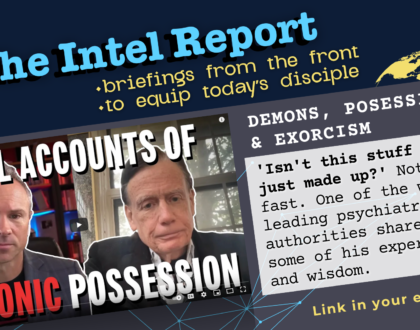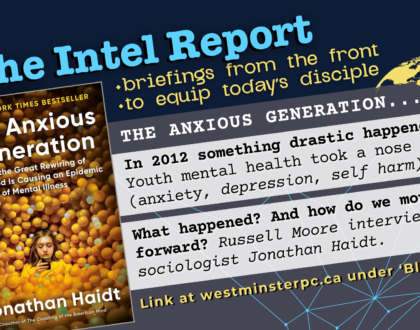Reflections on General Assembly in Halifax 2023

by Westminster
Pastor Ruttan
Recently I attended the General Assembly of The Presbyterian Church in Canada in Halifax, Nova Scotia.
This post is to provide some information about what that is, what happened, and some of my reflections about the experience.
In the New Testament church we hear about efforts to provide oversight and decision-making for the body of Christ. There was a concern for the well-being of churches and that they continue the ministry of Christ and the apostles. Modern denominations are how groups of congregations have come together to continue this pattern of oversight and shared ministry.
In Presbyterian churches there are four levels of governance (or courts): sessions (local groups of elders at the congregational level); presbyteries (regional governing bodies made up of pastors and elders from a certain area); synods; and the General Assembly (GA).
GA meets once a year and is the highest decision-making body of the denomination. They meet to consider reports and make decisions about doctrine, how we function, and priorities. That’s what happened in Halifax.
I attend about once every six years. This is on a rotational basis. The entire GA consists of a few hundred people from coast to coast; they are an equal mix of pastors and elders from local congregations.
First, Halifax was beautiful. We were glad that the forest fires were getting under control when we arrived and that neighbouring municipalities were helpful in providing assistance. The financial offering from the first worship service was donated to the efforts.
We stayed in the residences of Saint Mary’s University. It was a throw back by my university days. It was a cozy room, but my bed at home is way nicer!
Second, this was the first in-person assembly in four years. People loved that. It was great to connect with old friends from seminary and also to talk over dinner with other commissioners about the decisions before us.
Third, GA is not ‘all business.’ There were four worship services which we were able to participate in. There were also times to reflect on “good news stories” within the church and to intentionally reflect on how we might be the body of Christ in a time that has changed and is changing.
Fourth, before I share my overall impressions, let me describe some of the big-picture things that happened. I will not share everything (there was a lot), but this will give you a sense of some of what we discussed and decided.
a. There was an award presented called “The Cutting Edge of Mission.” This was given to Laila AlShekh and Robi Damelin. These women are Palestinian and Israeli mothers who both lost sons killed by each other’s community. One child was a 6-month old who died after their home was tear-gassed. The other child was killed by a sharp shooter. Both spoke about coming together, bonded by the loss of a child, to work for peace. At some point I will share the video of their talk. It was very inspiring and moving.
b. The Moderator is elected by the denomination from coast-to-coast (by ballot) and runs the meeting and represents the denomination for the year at various events. Her name is Mary Fontaine and she has been active in various truth and reconciliation efforts. She is the first Indigenous moderator of the GA. She was very prayerful and warm.
c. The opening worship service as held at the church of Saint David in downtown Halifax. Here is a recording of the entire GA singing “God is love: come heaven adoring.”
Words: Timothy Rees C.R. (1874-1939), alt Music: ABBOT’S LEIGH, Cyril Vincent Taylor (1907-1991); Words: copyright © Mowbray (an imprint of Cassell plc)
d. The Assembly Council presented a report which says we are at an ‘inflection point’ in the denomination. There are ‘choice to be made.’ Indeed. The PCC is spending 2.5 to 3 million more than it is bringing in each year. The annual budget for various ministries is 8 million. There is rapid numerical and financial decline. To compensate, it is borrowing from one of its own funds to make up the difference. This is ‘sustainable’ for about 10 years, possibly more based on investments, etc. This was an ‘elephant in the room.’ It was requested that a 3-year projected outlook come back to the next GA.
e. As a cost-cutting measure, we were reminded of a previous decision that the national office of the PCC is going to move; a shared space is being planned with the Anglican Church of Canada and the United Church of Canada in Toronto. The denominations will continue to be distinct, but will share space.
f. The Doctrine Committee is working on a piece about MAiD (medical assistance in dying), also known as physician-assisted suicide or death. It was requested that this work return with urgency to the 2024 GA given the rapidly changing landscape on this issue across Canada. Some commissioners were in favour of MAiD, some against.
An additional motion was passed in light of concerns with the loosening of certain requirements to access MAiD: “That The Presbyterian Church in Canada call upon the Government of Canada to value the inherent dignity, worth, and the right to life of disabled persons in Canada and to defend the poor and the marginalized in its ongoing consideration of Canada’s Medical Assistance in Dying framework.” Certain rights groups have become increasingly concerned over the changing (loosening) guidelines and this motion responded to those concerns.
g. The report of the Clerks included perhaps the most contentious issue of the GA. When the denomination previously approved two parallel definitions of marriage (one man and one woman or two adult persons) it was left up to local sessions (elders) to decide which they would follow. [As announced back in 2019, Westminster’s elders’ upheld the male-female definition.] In 2019 it was also approved that people in same-sex marriages could be ordained as pastors or ruling elders. “Liberty of conscience and action” was granted, meaning that if a pastor or elder at an ordination or induction objected, they would not be forced to participate.
In due time, the Clerks were asked for more clarity about what is meant by “liberty of conscience and action.” Here is the previous advice they gave to the denomination. Note, however, that the suggested additions to this advice appear in italics:
“An individual who holds the belief that marriage is between a man and a woman is permitted to exercise liberty of conscience and action and not be censured on account of this exercise. Limits to these liberties are stipulated in the remits [i.e. approved changes] and described below. The legislation in Remit C, 2019 stipulates that liberty of conscience and action applies to ‘participation’ in ordinations (ruling and teaching elders), inductions (teaching elders) and installations (ruling elders). Such a person may, without fear of censure:
– Abstain from voting for the ordination, induction or installation.
– Vote against the ordination, induction or installation, provided reasons for that vote are not based on the candidate’s sexual orientation, gender identity or marital status and voiced publicly as such.
– Send regrets to any meeting dealing with the ordination, induction or installation.”
This was a matter of some debate. Some felt the new wording was important to respect the individual and to abide by human rights legislation. Others felt that it impinged on liberty of conscience and action as promised in the original decision of the GA a few years ago. The Clerks realized this was causing issues they had not foreseen and decided to withdraw the wording to continue working on it for a better solution.
Let me highlight two other concerns with the Clerk’s report. In their preamble they talk about how liberty of conscience is ‘set within the bounds of the church’s theology and doctrine.’ In my view, that is incorrect. One’s liberty of conscience is guided by Scripture alone.
The other concern was a statement by the Principal Clerk. The PCC has “two parallel definitions” of marriage—something stated repeatedly by several commissioners. In response, the Clerk said: “I respect the questions. Um, I think the understanding here is that, really, someone had said we hold two different positions on marriage, and the fact is we hold the one position on marriage which is that within the one position people may choose to be aligned over on this side or aligned on this side. I want to make it clear that we don’t hold two separate positions, which would be one to the exclusion of the other. We hold one position where you may be here or you may be here, but they’re all accepted.” [When he said ‘you may be here or you may be here’ he was using hand gestures to indicate different positions along a spectrum of thought.] To me this is a concern because we have “two parallel definitions” as previously approved.
h. A recommendation was approved to give more of a coordinating function to the Assembly Council to ensure greater ethnic diversity on various committees in the PCC.
i. There was an update from the National Indigenous Committee. A recommendation was passed to prepare a renewed/second apology for the denomination’s role in the operation of Residential Schools. A call for a renewed apology is in light of developments since the original confession in 1994 (for example, the discovery of unmarked graves). This recommendation was in concert with calls from the Tseshaht First Nation. (Although the nation’s specific recommendation wasn’t discussed, their website calls for an acknowledgement of ‘genocide’ and ‘full cultural genocide’ in the context of an apology.) The Moderator spoke of the ongoing hurt and also importance of truth in the process of reconciliation.
j. The Trustee Board reported 14 congregations closing in 11 months. Elsewhere it was reported that 22 congregations closed in 2022. This process continues across the country at a fast pace.
k. In the context of the International Affairs report, the GA was made aware of the severe anti-homosexuality laws in Uganda, including the possibility of the death penalty. GA spoke against this clearly and committed $50,000 to help fleeing refugees. There was a lot of passionate discussion and unity on this issue.
l. A ‘Special Committee on Listening, Confessions and Associations’ had been struck last year to learn more about charges of racism within the denomination. A confession was read and approved. It was a prayerful time. Especially meaningful was input to the committee from members of Eastern and Western Han-Ca (Korean-speaking) presbyteries. There is ongoing work to do on a variety of levels. There was also discussion about (and commitment to) better translation services at future GA’s.
m. Every year there are Young Adult Representatives from across the country. They made valuable contributions; in their report they asked for greater representation on committees of the church and possible voting rights at future assemblies. These requests were studied and will be approved. There was much support from the floor.
n. Another “elephant in the room” was the ongoing theological divide in the denomination. This stems from the broadening of the definition of marriage, but is really about much more: ‘How do we understand the authority of the Bible? Who is Jesus? What is the mission of the church?’ My sense is that we struggle as a denomination to find unity on even these essential questions.
Finally, and as a closing thought, I appreciate the opportunity to participate in the GA of the denomination. It was a lot of work with hundreds of pages of reports to digest. I’m also not a fan of leaving my family for that long! But it was important work. It isn’t always “exciting” or easy, but it is essential as the church seeks to glorify God in a variety of ways and for a variety of diverse contexts.
I want to thank everyone who prayed for me and for the PCC as a whole during my time away. I actively felt the support and knew that the Lord was guiding me in my discernment. I truly felt the fellowship of the community of faith, and for that I am so very thankful!
There was some good work done at GA. I lament, however, that there was not more focus on the good news of Christ, on sharing his grace and truth with the world, on relying on the wisdom of our forefathers and mothers in the faith, and on engaging the Scriptures in a deep way. Perhaps this is a symptom of the theological division in the denomination as it struggles to find its way forward in a world on the other side of Covid-19 and a broadened definition of marriage which continues to be a source of significant controversy.
At the same time, I am not naïve. Renewal rarely happens from the top-down, but from the bottom up. It happens as disciples of Jesus Christ go about the prayerful, humble, loving, God-honouring work he has called us to do in the power of the Holy Spirit.
Come, Lord Jesus! Amen.
Recommended Posts

10 Unpopular things Jesus said
July 23, 2024

The Intel Report No.2 – Demons, Possession & Exorcism
July 17, 2024

1 would like more information on the MAiD being discussed at this general assembly in Nova Scotia.